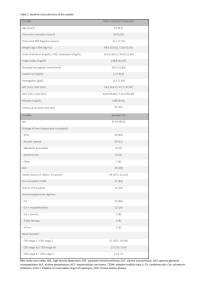Introduction: Type 2 diabetes mellitus (T2DM) is frequent in liver-transplant (LT) patients (pts) and worsens long-term clinical outcomes. Recently, new antidiabetic drugs were shown to provide adequate glucose control with minimal risk of hypoglycemic events while simultaneously offering cardiovascular and renal protection. The primary objective of this study was to evaluate the safety of these new hypoglycemic agents in LT pts. The secondary objective was to assess the efficacy of glycemic control, weight loss, and the reduction of insulin therapy requirements. Materials and methods: LT pts with T2DM were enrolled consecutively at the first visit to Clinical Nutrition Unit. Anamnestic, anthropometric, laboratory, and clinical data, including adverse events, were collected. The Local Etic Committee approved the study. Results: 62 pts were enrolled (M 50, F 12). At baseline (Table 1), 45 patients were on insulin therapy (11 basal and 34 basal-bolus). Metformin, DPP-IVi, GLP1-ras, and SGLT-2i were used respectively in 22, 3, 5, and 3 pts. At 12 months of follow-up, 27 pts were undergoing treatment with insulin (25 basal and 4 basal-bolus). The number of pts treated with other drugs rose to 51 for metformin, 14 for DPP-IVi, 29 for GLP1-ras, and 24 for SGLT-2i. 25 pts experienced mild adverse events; one pt had a serious adverse event (severe acidosis). There was no statistically significant worsening in any of the laboratory tests considered (the glycated hemoglobin remained stable even in pts who reduced or suspended insulin therapy). We observed a statistically significant weight loss at 12 months, with an average reduction of 4 kg, p<0.01. Conclusions: Treatment with the new hypoglycemic drugs proved safe in LT pts. Weight loss was assessed as statistically significant. Longer observation times are needed to evaluate long-term efficacy and possible effects on cardiorenal protection.


